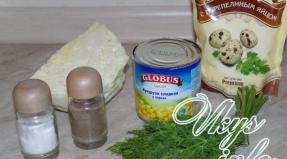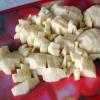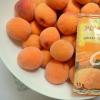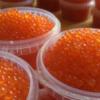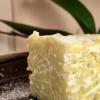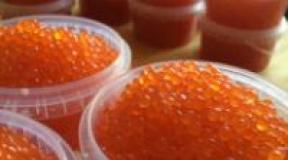Spices for steamed fish. What spices are suitable for fish
Fish occupies a special place in cooking.
This is due to its gastronomic variety and huge number of recipes.
Freshwater species
Freshwater fish is widespread in Russia due to the presence of a large number of rivers and lakes.
River fish for cooking:
- Catfish- the largest representative. Almost boneless and without scales, it is easy to prepare.
- Perch- is found everywhere and has delicious meat.
- Pike Is one of the most popular fish for its delicious white meat.
- Carp- the owner of the most tender meat. It is considered a "bony" fish.
- Trout- fish suitable for any kind of cooking.
- Sterlet- royal fish among freshwater. Possesses tender meat and becomes a delicacy in skilled hands.
- Carp- big and bold. Suitable for any kind of cooking.
No matter how popular and distinctively tasty fish is in cooking, suitable seasonings for it are an important issue in the kitchen.
Spices for the preparation of river fish
River fish does not have a bright meat taste. This determines the choice of spices and seasonings for use - they are all fragrant, pungent, with a pronounced aroma.
Frying
Frying fish is popular. The dish acquires a specific roasted taste, and dry meat increases the fat content due to oil.
Salt and hot peppers (black, red, white) are invariably considered spices for fish when frying. It is recommended to add salt directly to the oil. So the fish will "take" the required amount during the frying process.
When frying, you can add:
- garlic - a small amount will improve the taste of the dish;
- coriander, thyme, ground nutmeg - will enhance the taste and give uniqueness;
- turmeric - will give a rich golden color and a sweetish aftertaste;
- basil, dill, parsley, thyme, lemon balm - they are crushed and added at the end of cooking for freshness;
- lemon juice - a few drops on the meat will eliminate the river smell.
When choosing spices suitable for fish, it is better to refuse a mixture of 2 or more types at once, since when frying in oil, they enhance their properties.
Extinguishing
Most often, fish is stewed in oil, a vegetable pillow or in sauces. A small amount of spices can improve the final taste.
The following spices are suitable for stewed fish:
- peppers and mustard - for pungency;
- mint, basil, lemon balm or rosemary - for a fresh herbal scent (the main thing is not to overdo it);
- onions (any), dill - will enhance the taste of river fish meat.
Bright and spicy spices - curry, coriander, turmeric, cinnamon are better not to use when stewing fish.
Cooking
Cooking fish in a large amount of liquid imposes some difficulties for the choice of spices: they must "play" hot and be able to be absorbed into the meat from the broth.
The best spices for cooking fish are:
- Onions and bay leaves. With them, the broth will become richer. They will kill the river smell of fish during cooking;
- Peppers (any) from the broth will add a slight pungency to the meat. Will not hurt peppercorns.
- Celery and parsley - will make the fish taste richer.
- Saffron, nutmeg, rosemary, sage - leaving a bitter taste to the broth, they will give the fish only the best.
Cinnamon, paprika, turmeric, coriander, caraway do not tolerate cooking in a large amount of water. Having filled the broth with aromas, they will be useless for the fish.
Baking
Whether in foil or not, in the oven, microwave or on fire - baked river fish is loved by gourmets and nutritionists. The most common way to use spices is to cover the fish with herbs on all sides.
To bake river fish, use the following spices:
- Marjoram, anise, oregano - will enhance the taste of fish dishes;
- Onions, celery, parsley when baked - will "take away" the river smell;
- Bay leaves, lemon balm, mint - add a fresh aroma and can sweeten the taste of the finished dish.
- Turmeric, coriander or thyme will give spicy, rich flavors.
Smoking
Smoked fish is loved for its flavor and culture of consumption, even by those who do not prefer fish at all. Cooked on aromatic smoke, the fish does not need additional flavor enhancement.
When smoking, add the following spices:
- Celery - slightly under the ribs or gills for a pleasant aroma;
- Mustard, paprika, saffron or tarragon - your choice. Wipe the fish carcass from all sides before cooking.
The addition of oriental spices when smoking fish can clog the dish with a specific taste. It is not recommended to use them.
Marine species
Saltwater fish has a wide variety. Spices for her are "calmer" and more often serve to complement the rich taste.
Sea fish for cooking:
- Herring Is a popular sea fish. It is consumed salted, smoked and pickled.
- Mackerel- fish with fatty meat. Retains great taste in any form.
- Flounder- the meat is easy to boil. Suitable for roasting, stewing or smoking.
- Salmon(salmon, salmon) - have fat, tender red meat. Fish popular for cooking. Almost no intermuscular bones.
- Pollock Is one of the most common marine fish. Suitable for any type of cooking.
- Cod- has tender meat and is considered one of the most useful and nutritious. Contains a large amount of protein.
- Sturgeon- a delicacy breed. Used for cooking balyk, smoking, salting.
Spices for cooking sea fish
As mentioned above, marine fish species do not require bright spices in cooking. The amount of additives must be carefully controlled so as not to lose the delicate taste of the fish dish.
Frying
All types of sea fish can be fried. Due to the natural fat content of meat, halibut, mackerel, sturgeon, fatty herring can be fried even without oil.
A good addition to cooking will be:
- Ground pepper (allspice, black, red, white), added in moderation, will not so much add spice as it will enhance the natural taste of fish meat.
- Grated ginger or nutmeg will add spice. It is difficult for them to interrupt the "sea" aroma.
- Oregano or thyme add a touch of spice.
- - will add a touch of freshness to rich fried fish meat.
Fried sea fish does not go well with cardamom, caraway seeds, coriander. They interrupt the taste by making the dishes too spicy.

In the preparation of fish dishes, one can hardly do without spicy-aromatic plants. They impart a spicy aroma to fish, improve taste and quality.
The purpose of this or that spice is individual. With the help of crushed calamus rhizome, for example, they thicken the flesh of the fish, improve its aroma and taste.
Anise(crushed seeds) in combination with other spices improves the aroma of the fish and gives it a sweetish taste.
Basil camphor used for coloring the surface of fish in a golden color, imparting a spicy taste with a slight bitterness.
Eugenolic basil also gives the fish a golden color and a pleasant spicy aroma.
Oregano powder ordinary gives fish dishes a slightly spicy taste.
Hyssop common gives fish an intense spicy smell.
Sowing coriander(seeds) is always a part of spice mixtures for fish dishes. It is added to imported spice mixtures in an amount of up to 35-40%. Most often, these mixtures include, in addition to coriander, basil, black pepper, white pepper, thyme, caraway seeds, saffron.
Pharmacy lovage(in the form of a decoction) improves the taste of fish, gives it a spicy aroma reminiscent of the smell of parsley, celery, gives a creamy hue.
Garden marjoram used in small quantities; it imparts a persistent spicy smell and taste.
Melissa officinalis(in the form of a decoction) gives the dishes a spicy lemon flavor.
Long-leaved mint promotes darkening of the fish surface, gives a pleasant aroma and sweetish taste.
Thyme creeping is a part of imported fish seasonings, gives the fish a spicy smell and taste.
Fennel common are used alone and mixed with other herbs. Fish dishes get a spicy aroma and sweetish taste.
Savory garden in the form of a powder is a part of imported spices. Improves taste and aroma.
In the broth clary sage the fish acquires a spicy taste and aroma.
Tarragon used in powder form to improve taste.
Various fish dishes are traditionally prepared with established herbs or mixtures of them.
V fish salads add anise, basil, green onions, garlic, horseradish, red pepper, allspice, parsley, chives, hyssop, lemon balm, capers.
Anise, tarragon, rosemary, thyme, curry mix, etc. are suitable for fish soups. For more details, see “Herbs and spicy mixes for soups, cabbage soup and borscht”.
Anise, onion, garlic, cloves, bay leaves, parsley root, basil, savory, fennel, allspice, lemon balm, thigh-saxifrage, nutmeg are used with boiled fish.
Anise, basil, parsley and dill, garlic, savory, cucumber, fennel, cumin, nutmeg, red bell pepper, lemon balm, sweet and bitter almonds, watercress, cardamom, coriander, peppermint are suitable for fried fish.
It is better to bake fish with cayenne pepper. Marjoram is added to the aspic.
Other seafood is also cooked with herbs. Cayenne pepper, cumin, thyme, tarragon are most often used.
Spicy herbs for fish dishes are consumed raw and dried. Raw ones are crushed, chopped, and dried ones are finely ground (calamus root, angelica, bay leaf and a number of other herbs). Parsley roots, onions, garlic are chopped.
Most often, a spicy mixture consisting of parsley (leaves) is used for cooking fish - 1 tablespoon; celery (leaves and roots) - 1 tablespoon; garden savory - 1 teaspoon; fennel (seeds) -0.5 teaspoon; bay leaf - 2 pcs; peppercorns - 1 pc.
If they take dry spices, then, after grinding them well, they pour the product along with salt, sugar, so that the fish gives juice and is well saturated with the smells of seasonings.
If decoctions are prepared, then water-salt solutions or sauces are added to them.
From spicy herbs for fish dishes, you can prepare marinade fillings. There are several ways. Here is some of them:
1 way. The spice mixture is heated to a boil (but not boiled) in a small amount of pure water (1/5 of the required dosage) with the lid tightly closed for 20-30 minutes and added to the boiled brine (4/5 dosage).
Method 2. The spices are heated to a boil (but not boiled) in half the amount of water and the other half of the solution is added in the form of brine.
Method 3. The spices are poured over with boiling water (50% of the norm) and kept until cooled, tightly closing the dishes and wrapping them up.
Method 4. A gauze bag with spices is immersed in water at a temperature of 95–98 ° C for 30 minutes in a tightly sealed container.
Marinade fillings- perishable product. They are not stored at a temperature of 10 ° C. more than three days.
The meat of most fish tastes neutral and soft. Therefore, almost all types of seasonings known in cooking are suitable for it, and the choice of spices when preparing dishes depends on prevailing preferences in different regions of the world. For example, in Europe, preference is given to spices with a mild flavor, while in Eastern countries, a choice of seasonings with a pungent taste is characteristic.
However, there is a so-called classic set that suits almost all types of fish, and it includes pepper, lemon, onion, nutmeg, parsley and dill.
The selection of herbs as seasoning for fish is even wider and includes arugula, fresh basil, parsley, shallots, celery, dill.
Seasoning for freshwater fish
Fish spices are intended for the following functions:
1. Strengthening the taste inherent in this type of fish;
2. Changes in taste, creating original combinations;
3. Skillful use of proportions and rules for the use of seasonings for fish.
Basically, all fish can be divided according to their habitat into freshwater and seafood. The most common and popular river fish for cooking are catfish, perch, pike, carp, carp, trout and sterlet.
River fish do not have a very pronounced taste of meat and for their preparation they use fragrant, spicy, with a pronounced aroma of spices. The exact choice of seasoning depends on the cooking method. Carp, like carp, has a very soft and tender meat. When preparing them, bitter and allspice peppers in ground form, cloves, bay leaves, sugar with vinegar, and onions are used.
Pike is perfectly absorbed by the body, and its proteins in their biological value are higher than meat proteins. Therefore, pike is widely used in the diet. For pike, it is enough to use a mixture of peppers, bay leaves, onions and fresh dill.
The specific smell of crucian carp, inherent in all pond fish, requires seasonings with a stronger, more pronounced aroma. Ground ginger, garlic, celery are good.

Seasoning for sea fish
Among the most common marine fish, hake (hake) rightfully occupies a leading position in consumer demand. Pleasant, delicate taste reminiscent of cod, but it is more fatty. Among the various spices, black pepper, basil, garlic, cloves, bay leaves, thyme, lemon balm, rosemary and caraway are best combined with hake.
A good addition to halibut, herring, mackerel dishes is ground pepper, nutmeg, grated ginger, thyme, lemon balm. In this case, all types of pepper are used. Parsley, onions, cloves, bay leaves, which are used in moderation, give additional shades to the taste sensation.
For the preparation of pollock, a minimum set of spices is used, consisting of pepper, green onions and parsley and dill.

Seasoning for boiled fish and steamed
Considering the almost unlimited possibilities of experimenting with the taste and aroma of fish, the selection of spices is guided by a specific cooking method. The most common way of preparing a dish is fish, boiled or cooked in a small amount of liquid. With this method of preparation, bay leaves, garlic, onions, cloves, rosemary, basil, lemon balm are the best choices.
For lovers of healthy food, steaming is the most popular method. Seasonings are taken in small quantities, which, being dissolved in the juice of the fish itself, do not drown out, but emphasize the taste. The classic version of a harmonious flavoring bouquet when stewing fish consists of bay leaves, several peppercorns of any kind and whole parsley stalks.
When cooking fish, the difficulty in choosing seasonings is that they feel in the hot broth, and at the same time can be absorbed into the meat.
To saturate the broth and eliminate the specific river smell of fish, bay leaves and onions, celery and parsley are used. Adding saffron, rosemary, sage and nutmeg to the broth favorably emphasizes the taste of meat.
When cooking sea fish, many people prefer not to use spices at all. If you want to achieve original shades in taste, you can add onion or parsley to the broth. The broth will be tastier and more aromatic when you add ground pepper and bay leaves, and a small amount of cloves adds spice.

Seasonings for baking and stewing fish
One of the varieties of cooking fish in its own juice is baking and stewing. Pepper and mustard add spice, while a little mint, basil, rosemary or lemon balm gives the fish stew a fresh flavor. The addition of onion and dill enhances the flavor of the fish dishes.
The methods of baking fish are very diverse and everyone can choose the most suitable one for themselves. The use of spices in baking often involves covering the fish with herbs on all sides.
Marjoram, anise, oregano will enhance the taste of the dish, kill the smell of the river - parsley, onion, celery. They will sweeten the taste of the finished dish and add freshness to the aroma of baked fish bay leaf, mint, lemon balm. The addition of turmeric, coriander or caraway seeds add to the subtle flavor.
Stewing sea fish, which cannot stand bright spices, has its own nuances. First of all, it is necessary to control the amount of added spices so that the fish does not lose its inherent delicate taste and aroma.
The rich aroma of allspice allows it to get lost in sauce or vegetable juice. The addition of mustard to the sauce adds a slight pungency to the sweet and sour taste, while ginger or nutmeg makes the dish spicy and richer. Garlic, which brings pungency and at the same time does not drown out the main aromas, is an indispensable addition to fish dishes when stewing.
When baking fish, lemon juice or onions are indispensable attributes. The spiciness of the baked fish will be provided by ground bay leaves, allspice and celery, and the addition of basil, thyme or fennel will provide aromatic freshness. Turmeric or paprika add new colors to the gastronomic bouquet, and a sprig of rosemary will not only decorate the dish, but also bring its own special note.

Seasoning for frying fish
You can quickly fry fish in a pan, grill or oven, preserving its texture and natural appearance as much as possible. Traditional salt, pepper and lemon juice are the most popular with this method of preparation. The main condition for the use of pepper, which can be either white or black, is a coarse grinding done just before use.
Fried fish goes well with olive oil, and the finished product is sprinkled with lemon juice. Experienced cooks advise, when frying in a frying pan, to salt not fish, but oil. In this case, the fish itself will take as much salt as needed.
If the fish is fried on a wire rack or wire mesh, sprinkle it with coarse salt one to two hours before the start of the process. Before frying, the whole fish or pieces are greased with vegetable or butter and sprinkled with pepper.
Pike and large perch fried over coals are delicious. In this case, spices and oil are placed inside gutted and salted fish. Best suited for roasting in the oven are bream, herring, pike and small salmon fish.
The grilled fish seasoning contains a mixture of aromatic herbs. When grilling fish, paprika, saffron, mustard seeds, tarragon, turmeric are perfect.

Salting and marinating fish
Fatty fish such as salmon, herring, whitefish are used for salting. Lightly salted type of salting provides for the expansion of the list at the expense of trout and flounder.
For the preparation of fish with spices, a marinade is used, which rightfully bears the name "divine". It contains basil, dried parsley and garlic, oregano, fennel seeds, bay leaves, lemon peel and of course salt.
Several seasoning options are recommended for stocking dried fish. In the first version, the seasoning includes bay leaves, coriander, allspice, caraway seeds, saffron and salt. Cilantro, marjoram, bell pepper, sumac, saffron, hops-suneli, paprika, chaman are included in the second version of the mixture for drying.
The original spice mixture is offered in another version and includes salt, sugar, lemon zest, pink pepper, saffron, juniper, star anise, dill.
Delicious spicy herring is obtained with cloves, coriander seeds, allspice, bay leaves.
Dill, parsley, bay leaf and lemon are used for salting red fish. At the same time, onion cut into rings and peppercorns are added.
When salting and pickling sea fish, it is allowed to use stronger spices such as tarragon, fennel, oregano, coriander, and peppermint.

The value of seasonings and spices for fish
The choice of spices depends on the method of preparation and the type of fish. However, there are so-called universal fish spices, suitable for both liquid dishes and hot ones.
Among the universal spices, first of all, black pepper, cloves, caraway seeds, parsley and bay leaves can be noted. In addition to influencing the palatability of fish cooked in different ways, they are beneficial for health promotion.
Black pepper improves blood circulation, is an excellent means of fighting obesity and metabolic disorders. The father of spices is black pepper. Its pungent taste and pleasant aroma add spice to the fish dish.
Red hot pepper, accelerating metabolism, helps to digest "heavy" food faster, helps in the fight against neoplasms.
Pink pepper, which does not in any way resemble a classic pepper, has a mild flavor with a tangy aftertaste and goes well with sea fish. Eating sweet peppers lowers the risk of developing Alzheimer's disease, prevents inflammation of nerve cells and the appearance of cancerous tumors.
White pepper disinfects mucous membranes, eliminating bad breath and boosts immunity.
Basil imparts firmness to meat and a pleasant spicy aroma to fish when cooked. Given the positive effect of basil on immunity, it is recommended for colds, coughs, fever.
Bay leaf. Adding bay leaves to the fish broth makes it more flavorful and the meat tastier. The bactericidal, restorative, cleansing effect of bay leaves is used in the treatment of colds, food poisoning, and fungal infections.
Coriander stimulates digestion, lowers bad cholesterol and flushes waste products out of the body. Coriander enhances the taste of the finished dish, making its aroma stronger.
Parsley, fennel and dill improve digestion processes, promote the elimination of toxins and toxins from the body, strengthen blood vessels and generally have a positive effect on the human body.
Melissa or lemon mint give the fried fish a rich, fresh flavor. Mint adds a sweet flavor to the dish.
Caraway. The spicy aroma and slightly pungent taste of cumin enhances the taste of the fish.
Ginger gives a pungent, full-bodied flavor, while the aroma and flavor of oregano goes well with basil, black pepper and rosemary. 
Do-it-yourself fish seasonings at home
There are a huge variety of fish seasonings on sale, depending on the heat treatment method chosen. However, if you want a fresh seasoning or to use in an original recipe, you can make a fish mix at home.
Universal seasoning composition
The universal fish seasoning contains: dried carrots and garlic, ground parsley, coarse salt, taken one teaspoon at a time. Add 0.5 tsp to them. a mixture of peppers, turmeric and marjoram.
All ingredients are placed in a mortar preheated over a fire and ground until a persistent spicy aroma is obtained. After grinding in a blender, the mixture is poured into a tightly closed glass container.
Danish fish dressing
For boiled, fried or stewed fish dishes, make a Danish dressing of mustard, apple cider vinegar and sour cream or cream. 2 tbsp dry mustard is mixed with 1.5 tbsp. sugar and add vinegar, bringing to the consistency of sour cream. An hour later, sour cream or cream is introduced to taste and the dressing is ready.

Recipes for the most popular fish dishes
For stewing, fish of low-fat varieties and containing many small bones are chosen. This is due to the fact that during the heat treatment process, small bones are torn, becoming invisible, and the richness of the taste is achieved due to seasonings. The heads and tails of fresh fish are cut off, which are set to boil. The carcass is cut into pieces and, rolled in flour, lightly fried in vegetable oil. Hake or pollock meat is watery, so it is recommended to soak the carcass in strongly salted water for 30 minutes before cooking, so that the pieces do not fall apart in the pan during frying. Then the “onion” pillow is prepared from 4 onions cut into half rings and fried. Half of the prepared onion is laid out in a saucepan and allspice, laurel leaf, cloves and a pinch of salt and sugar are spread on it. Then the pieces of fish are laid out, and the second half of the prepared onion is poured. Fill with a small amount of broth, set to cook on low heat.
Trout in pots is stewed with vegetables. At the bottom of the pot are chopped bell peppers, to which you can add pre-fried onions and carrots. You can also add peas and tomatoes. Salt and pepper the pieces of fish, arrange in pots. Top with a small amount of dry white wine and lemon juice. Put in a cold oven and stew for 45 minutes at a temperature of 200 °
The Portuguese stew cod in Austrian sauce. For the chopping sauce, the white onions are fried in butter and flour is added, frying together for a short time. Pour ½ tbsp into the fry. hot water and a glass of dry white wine. After boiling the mixture, add black pepper to taste, a little salt, a pinch of cinnamon and cloves, 1 tsp. grated chocolate. Cod is placed in the sauce heated to thickening sour cream and stewed.
For fish soup from small fish, take 1 kg of fish, 10 allspice peas, 1 onion, bay leaf in two liters of water. The spices are boiled separately for 15 minutes. in 0.5 liters of water. The fish is poured into 1.5 liters of water and set to cook, periodically removing the foam. When the foam stops forming, spices are poured into the fish pan. Ukha is cooked for about half an hour over low heat.
The almost unlimited choice of spices that can be used to prepare fish dishes provides ample opportunities to create unique flavor characteristics.
Video "Seasoning for fish"
Fish is an integral part of every person's diet. Although it itself has a neutral odor, it perfectly absorbs the aromas of various spices. Seasoning for fish emphasizes its exquisite, original taste. How to choose the right spices to make the dish really delicious and very tasty? This question interests many housewives.
Seasoning for fish: composition. The role of certain spices in the taste of a fish dish
Spicy aromatic plants have been used since ancient times to improve the taste of fish. Probably everyone who prepares fish dishes knows that it goes well with lemon or lime, allspice, bay leaf, herbs, rosemary, basil. But to create a truly original flavor, other seasonings are also used.
Few modern housewives know that the purpose of a particular spice is individual. Seasonings for fish, depending on the method of preparation, include the following aromatic plants:
- crushed anise seeds - add a sweetish taste to dishes;
- camphor basil - helps to obtain a golden color in fish;
- oregano powder - gives fish dishes a spicy taste;
- coriander seeds - give an exquisite aroma, in most cases are part of the above seasonings;
- pharmacy lovage - gives the fish a smell, reminiscent of the aroma of parsley and celery;
- Lemon balm - gives these dishes a slightly lemon shade;
- fennel - contributes to the sweetish taste of the fish;
- long-leaved lemon balm - prevents darkening of its surface;
- tarragon and thyme - improve the taste of the above dishes;
- clary sage - contributes to the exquisite aroma of fish.
It should be noted that there are no specific spice lists for a particular type of fish. Each housewife can safely experiment with the above spices, trying to create her own original set of aromas.
What seasonings are best for fish?

The set of specific spices depends on the method of preparation of the fish dish.
Fried fish is best cooked with the following herbs:
- pepper - red and black;
- basil;
- coriander;
- fennel;
- Melissa;
- Bay leaf;
- turmeric;
- cardamom;
- thyme;
- saffron.
Seasoning for smoking fish to prepare the marinade is used as follows:
- fennel;
- tarragon;
- pepper - white, fragrant, black;
- nutmeg;
- coriander;
- oregano;
- bay leaf;
- peppermint;
- basil;
- Dill;
- rosemary;
- sage.
If you are going to grill fish, then choose the following spices:
- tarragon;
- paprika;
- saffron;
- turmeric;
- mustard seeds.
Stewed and boiled fish goes best with such spices as:
- Carnation;
- bay leaf;
- cumin;
- basil;
- bitter pepper (all its types);
- rosemary;
- borage;
- Melissa.
- parsley;
- hyssop;
- lemon balm;
- allspice;
- capers;
- basil;
- anise.
Fish soups are delicious when you add to them:
- tarragon;
- anise;
- rosemary;
- curry mix;
- thyme.

When trying to create your own set of scents, you should consider the following points:
- European aromatic plants have a slightly mild flavor. Therefore, if you add more than necessary, the taste of the fish can still be saved.
- Oriental spices are characterized by a peculiar pungency, as a result of which a certain "overkill" can ruin the final dish.
It is also important to remember that there are spices that are added only at the end of cooking fish, and there are seasonings that require a long heat treatment. Only then can their real aroma be revealed.

Little tricks for preparing delicious fish dishes
- For fish soup, it is advisable to add parsley and bay leaves and very little sage and coriander.
- Fried fish should not be heavily seasoned with spices.
- Baked fish is just that dish where you can safely experiment with spices.
The seasoning for fish is selected depending on the method of preparation. To create a unique original aroma of a dish and improve its taste, it is important to take into account the purpose of a particular spice plant. A properly selected seasoning for fish will beautifully emphasize and complement its natural taste.
Fish should be present in the diet of every person. It is very useful as it contains essential trace elements, proteins and amino acids. And unlike meat, it is a more dietary and easy-to-digest product. But not all housewives love to cook fish. This is due, first of all, to its specific smell. In order to muffle it, you need to properly use various seasonings. True, not everyone knows which spices are best for fish. Some of them mask the smell, others emphasize the taste. And if used improperly, spices can ruin the finished dish.
What spices for fish are used most often
When cooking, it is very important not to overdo it with seasonings and choose their combination correctly. Spices should accentuate the flavor of the fish and enhance it, not interrupt it. Different spices are used depending on the preparation method. What are the most popular spices for fish?
- Parsley goes very well with fish. Its greens and roots gently complement the taste of the fish.
- All types of pepper are suitable for such dishes. When cooking, it is better to add peas, and ground fish in fried and baked fish. But the main thing is not to make the taste very spicy.
- Fragrant rosemary enhances the delicate taste of boiled fish, suitable for baking and frying.
- When cooking fatty varieties, it is customary to add fennel.
- Mustard goes well with boiled fish and is very good in sauces.
- Savory gives dishes an amazing aroma, but you only need to add it at the end of cooking.
- Almost all housewives know that bay leaves need to be added to the ear.
- Basil is a must-have for many fish dishes. It makes them aromatic and juicy.
- Any kind of fish goes well with lemon or lime.

How to choose a seasoning depending on the type of fish
Spices should enhance the taste of the finished dish. Therefore, when cooking river and sea fish, it is recommended to add different spices. Although not all culinary schools make such recommendations. River varieties are more bland, so their taste needs to be enhanced and emphasized. And for a marine product, seasonings are almost not needed.
What spices are suitable for You can choose more spicy and aromatic seasonings. Dill, black and red thyme, caraway and oregano are the best to emphasize the taste of river fish. Almost always, during the preparation of such dishes, onions and garlic are added. For juiciness and aroma, you can sprinkle the fish with lemon juice. And those who love spiciness use curry or. At the same time, sea fish itself has a strong taste and aroma, so you should choose the seasonings carefully. Garlic, onion, cumin, ginger, and lemon zest are best used. But it is better not to experiment with hot spices, as they interrupt the taste.
What to add to fried fish
Many people think that this dish is already tasty, so you should not add seasonings. But no chef will send fish to the pan without sprinkling it with lemon juice and hot pepper. Coriander, cumin and nutmeg are also good. An original and tasty dish will turn out with this set of spices: salt, pepper, garlic and herbs. All this must be mixed, roll the pieces of fish in spices, pour with olive oil and leave to marinate a little. Only then can you fry.

Seasonings for cooking fish
The ear is very popular in many countries. But you need to remember that when cooking, part of the seasonings dissolves in the broth. It is customary to add such spices for fish: onions, bay leaves, black peppercorns and dill. But you can also improve the taste with cloves, cumin and parsley. For a more sophisticated spicy aroma, add saffron, rosemary, nutmeg and sage. Many vegetables also improve the flavor of the fish when cooked. Therefore, together with it, carrots, celery and parsley root, and leeks are added to the water. If the fish has a specific smell, you can kill it with vinegar or cucumber pickle. But when cooking sturgeon, no spices are added.
If you bake the fish
It is not recommended to overuse spices with this cooking method. Most often, when baking, add onions, garlic, lemon and The most popular method of cooking is on an onion pillow: onion rings are placed on foil, then pieces of fish are sprinkled with salt, pepper and rosemary. The foil is wrapped and the dish is cooked in the oven. Fish cooked in the same way with horseradish will turn out to be no less tasty. Of the herbs, fennel, basil, rosemary or savory are more suitable for baked fish.

What spices for fish are added when salting and pickling?
This cooking method does not require hot spices. There are housewives who like to salt or pickle fish on their own. They use their favorite seasonings, and the taste of the dish always comes out special. What are the best spices for salting fish? Delicious spicy salted herring is made with allspice, cloves, bay leaves and coriander seeds. Red fish is salted with dill and parsley, bay leaves and lemon. Often, with this method of preparation, onions, cut into rings, and mustard peas are added.
Read also ...
- Chicken liver pate
- Delicious zucchini with cheese in sour cream in the oven - a step by step recipe with video Zucchini recipes in the oven with sour cream
- Banana rice and corn flour pancakes (gluten free) with homemade banana sauce Banana pancakes with semolina
- Cabbage casserole with chicken Chicken fillet casserole with cabbage
